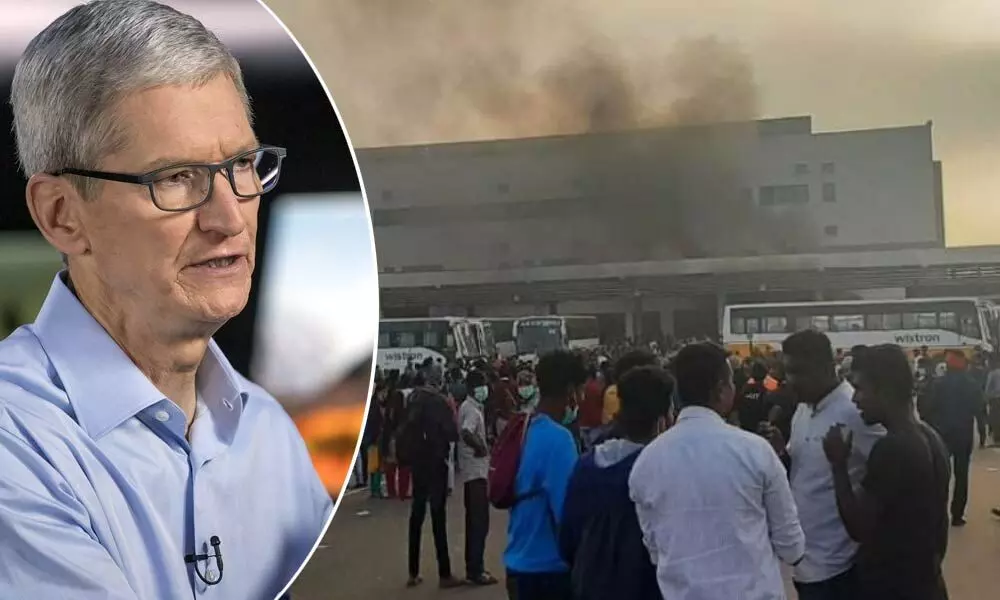Foreign companies should understand local realities
Workers at Wistron reported to be fed up with delayed and underpaid wages
image for illustrative purpose

India is democratic. Its unions are vocal, and local politicians have to be responsive. Foreign companies eager to tap the large domestic market and vast labor pool will need to adjust to the reality that workers may be more quick to stand up for their interests
For more than a decade, companies like Apple Inc. have entertained the idea of evolving away from China-based supply chains to have their devices made in lower-cost locales like India, Vietnam and Mexico.
The challenge of such decentralization became brutally evident last weekend with an uprising at a factory operated by Taiwan's Wistron Corp. that makes iPhones in India. Workers at the plant in Narasapura, 40 miles from the tech hub of Bengaluru, were reported to be fed up with delayed and underpaid wages and ransacked the factory, destroying equipment and burning vehicles.
Local police responded by swinging lathis - long batons that are used for crowd control - to quell the dawn protest. Over 100 people were detained, local authorities were cited as saying.
Wistron said Monday that those involved were not company workers, but didn't provide evidence. A Toyota Motor Corp. unit has also had recent trouble in the same state, Karnataka.
Apple Chief Executive Officer Tim Cook and Taiwan President Tsai Ing-wen ought to be worried.
Cook, who headed operations before taking over the top job, is among global leaders searching for alternatives to the stability and reliability of a Chinese workforce that still makes the lion's share of the world's gadgets. But costs are rising, and this year's pandemic has highlighted the trade and security risks from having too much of the supply chain in one place.
India is one obvious choice. Its population is almost as large, wages are far lower, and its governments - local and central - are willing to offer incentives to lure manufacturing. New tariffs on imports and requirements imposed on Apple to procure locally have further strengthened the need to produce in India.
Tsai is equally eager to wean Taiwan's companies off China's business as her government faces down growing threats from Beijing. India has its own growing list of issues with China, including border clashes this year that led New Delhi to ban apps and other products made by China's biggest companies. Relations between Taiwan and India have been growing closer.
Taiwanese companies have been among the most public supporters of Prime Minister Narendra Modi's Make in India campaign. In 2015, Foxconn Technology Group founder Terry Gou dined with Modi during a trip that included an announced plan to invest $2 billion - the iPhone 11 went into production in India this year.
Yet the largest investors in Indian electronics production, chiefly Taiwan stalwarts such as Foxconn, Pegatron Corp. and Wistron, are also highly wary of pitfalls.
Whereas Foxconn employs hundreds of thousands of people in China during the peak iPhone season at facilities in Shenzhen and Zhengzhou, it's less keen to deploy that mega-factory model in India.
The reason is labor
A senior Foxconn executive once told me that the company would like to cap India plants at 10,000 workers. Any bigger, and they'd be at the mercy of unions and local politics. A handful of such smaller factories would spread the risk and reduce reliance on any single facility or jurisdiction.
Although, labour protests have broken out at electronics manufacturers in China, including the 2012 riots caused by the iPhone "scratch gate" saga, they're relatively rare given the size of the overall workforce. Central and local governments in China brook no dissent, allowing operations to run relatively smoothly, even at the expense of workers' rights.
Many times, where protests have occurred, they've been with the tacit approval of authorities.
But India is democratic. Its unions are vocal, and local politicians have to be responsive. Foreign companies eager to tap the large domestic market and vast labor pool will need to adjust to the reality that workers may be more quick to stand up for their interests. And Cook will need to get used to his company's name alongside words like riot and uprising.
In many respects, it's unfair to pick on Apple - the latest complaints appear aimed squarely at Wistron - yet the US company is the client and wields the power to force change, something it's done in China over the past decade.
Tsai also better hope Taiwan's companies adapt quickly. While she exerts limited control over private firms or their operations overseas, any dispute involving one reflects badly as she seeks to build alliances. She can ill afford to see the Taiwan brand tarnished.
As the world struggles to devolve away from China in a search for supply chain security, political and corporate leaders need to find ways to accommodate a global workforce that wants its own security, too. (Bloomberg)
Tim Culpan

